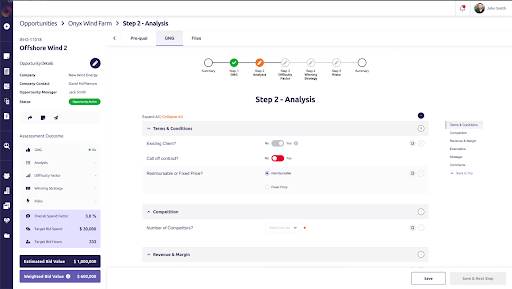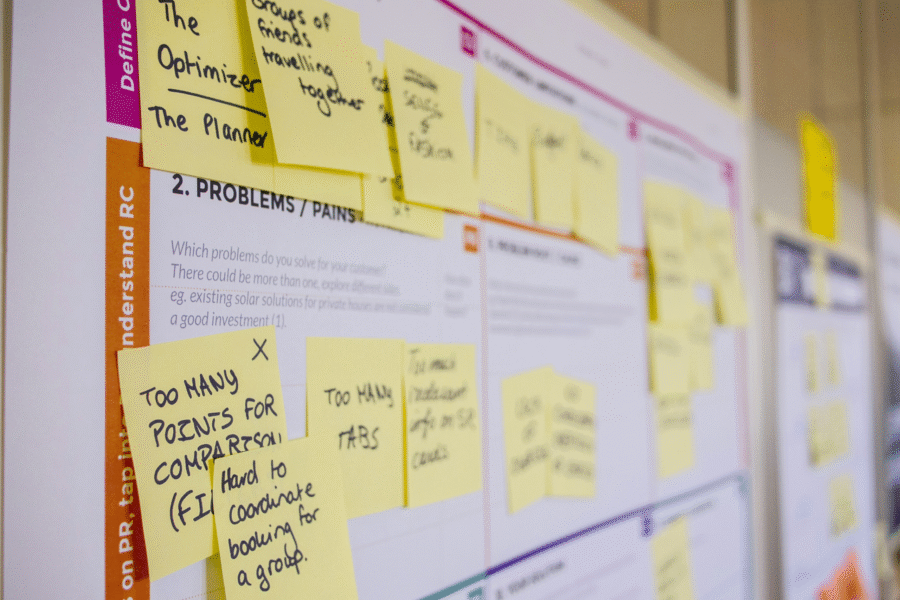Engineering consultancies operate in a high-stakes environment where growth depends on winning the right projects. Yet many still rely on intuition when deciding which bids to pursue, leading to inconsistent results.
This article explains why structured Bid/No-Bid assessments are essential for engineering consultancies. It covers the risks of informal bid selection, outlines key evaluation criteria, and demonstrates how data-driven tools like Proteus improve project opportunity management, win rates, and profitability.
What is a bid/no bid assessment?
A bid/no-bid (or go/no-go) assessment is a structured evaluation used to determine whether an organisation should pursue a business opportunity. This process assesses the feasibility, profitability, risks and strategic alignment of a potential project before committing resources and writing a proposal.
The criteria you assess to evaluate whether or not your organisation enters a bid or not will vary from company to company. However, there are key areas that will always need to be considered to justify committing time and resources to a costly proposal. These include looking at a project’s technical, financial, organizational, and environmental factors to determine whether it is worth pursuing. The goal of the bid/no bid process is to focus on high-value opportunities and avoid costly, low-probability bids to improve win rates and efficiency.
What happens if a company doesn’t have a process for assessing project opportunities?
Failing to carry out an adequate project bid/no-bid assessment can result in costly mistakes, missed opportunities, and negative impacts on the organization’s reputation and financial performance.
Some of the reasons why companies may fail to conduct an adequate bid/no-bid assessment include:
- Lack of Time: Sometimes, companies are under pressure to submit a bid quickly and not enough time is given to evaluate the project properly.
- Lack of Resources: Smaller businesses may not have the necessary resources, such as staff numbers, expertise or software to conduct a thorough bid/no-bid assessment.
- Overconfidence: Companies may be overly confident in their abilities and believe they can deliver any project, regardless of its complexity or scope.
- Bias: Companies may be biased towards pursuing certain projects, even if they do not align with their capabilities, expertise or strategic goals.
- Incomplete Information: Sometimes, companies may not have access to complete or accurate information about the project, which can make it difficult to conduct an adequate bid/no-bid assessment.
What Problems Does a Project Opportunity Assessment Solve?
In a competitive market with tight margins, a data-driven project opportunity assessment helps consultancies prioritise the right bids and optimise limited resources.
Key benefits include:
1. Minimising Risk
A structured Go/No-Go assessment identifies potential project risks early, helping teams mitigate them before committing time and money.
2. Ensuring Feasibility
The process evaluates whether the project aligns with the organisation’s technical capabilities, staffing, and financial strength, reducing the risk of failed delivery.
3. Maximising ROI
The go/no-go assessment helps to evaluate the potential profitability of a project and ensure that it provides a good return on investment for the organization. This also considers the process of investing in the proposal writing process which often uses up a vast amount of time, particularly for seller-doer team members who not only win work but do the project work as well.
4. Focusing Strategic Resources
A consistent framework directs effort toward strategic, high-value opportunities, improving productivity and organisational focus.
Key Data Points for Smarter Engineering Project Bid/No-Bid Decisions
A robust bid/no-bid framework should incorporate objective data to improve decision-making. Some essential data points include:
1. Financial Viability
- Estimated project revenue vs. cost
- Likely profit margins
- Payment terms and client financial stability
2. Resource Availability
- Current workload and capacity of key staff
- Availability of specialised expertise
- Alignment with ongoing projects to maximise efficiency
3. Competitive Landscape
- Number of competitors and their track record
- Your company’s unique differentiators
- Probability of winning based on past performance
4. Client History & Relationship
- Previous working relationship with the client
- Payment history and contract terms
- Long-term strategic value of the client
5. Project Risk & Complexity
- Technical challenges and feasibility
- Regulatory and compliance considerations
- Risk mitigation strategies required
Using this structured evaluation, engineering consultancies can move beyond guesswork and make more calculated decisions.
Technology’s Role in Bid Selection
Traditional bid/no-bid processes often rely on gut instinct, ad hoc discussions or scattered spreadsheets. However, Proteus’ Opportunity Feature, allows consultancies to take a structured, data-driven approach to bid assessment.
1. Centralised Opportunity Management
Proteus provides a single digital platform for tracking all potential opportunities, ensuring every stakeholder accesses consistent, up-to-date information and eliminating fragmented and informal decision-making.
2. Objective Bid Scoring & Analytics
Proteus allows engineering consultancies to score opportunities based on pre-defined criteria, such as strategic fit, risk level, financial viability, and probability of winning. By applying weighted scoring models, teams can compare multiple opportunities side by side and focus on those with the highest strategic value.
3. Auditable Decision-Making
One of the biggest challenges in bid/no-bid decisions is the lack of documentation and post-decision review. Proteus creates a fully auditable trail of bid discussions, approvals, and justifications. This allows leadership to revisit past decisions, analyse trends, and refine bid strategies over time.
4. Workflow Automation & Approvals
Built-in workflow automation ensures that bid reviews, comments, and approvals happen seamlessly within the platform, speeding up response times for high-value opportunities.
5. Integration with Project Proposals and Project Delivery
Successful bid decisions should feed seamlessly into project execution. Proteus ensures that once the decision to bid is made, all relevant data is automatically transferred into the proposals section, streamlining proposal development. Furthermore, when a project is won this is automatically transferred into an active project that can be tracked in real-time.

Case Study: Data-Driven Decision-Making in Action
A mid-sized engineering consultancy specialising in infrastructure projects previously struggled with bid efficiency, often chasing low-margin projects. By implementing a structured bid/no-bid framework and using technology to track bid performance, they achieved:
- A 25% reduction in wasted bid resources
- A 15% increase in win rate
- Improved profitability by focusing on high-value opportunities
This example highlights how structured decision-making can enhance business outcomes.
About Proteus
Proteus developed by a Scottish-based tech company, Xergy Group, is an end-to-end project management solution developed for the energy and engineering consulting industries.
Proteus is industry-proven and enables consultancies to meet project demands across the full lifecycle, from proposal development to project delivery. With robust sales and project delivery modules, Proteus helps its customers win more business, increase efficiencies, manage expenditures, and improve project controls.
Critical workflows, automation, and controls are integrated into Proteus. These include opportunity evaluation, proposal building, resource planning, budget tracking and forecasting, real-time multi-level restricted dashboards, and project performance analytics.
Third-party integrations and customised solutions allow Proteus’ users, which include C-suite, project leads, and engineers, to get the exact software solution needed for their business.
We offer a free onboarding consultation service to ensure your company account is set up to your company’s needs.
How to get Proteus
Proteus operates under a software-as-a-service (SaaS) model. We offer Enterprise packages and flexible pricing solutions: contact our team to learn more.
We designed Proteus to be simple, and that means you can get up and running on Proteus without an IT team or support from a programmer. You will want to spend a bit of time configuring the admin console so that you have everything set up to suit your company structure, but it’s very intuitive and you don’t need a PhD in IT.
However, we want you to get the best out of what is a brilliantly powerful tool, so don’t hesitate to ask for our support. We have a team of product experts who are ready to help you with the configuration process, so get in touch today by filling out the form below:



